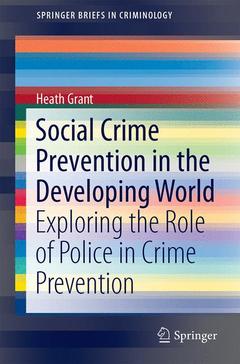Social Crime Prevention in the Developing World, 2015 Exploring the Role of Police in Crime Prevention SpringerBriefs in Policing Series

This Brief explores the role of social crime prevention as a crime reduction strategy in the developing world. "Social crime prevention" focuses on the social and economic factors that may contribute to violence and criminal behavior in a community. Particularly in the developing world, an understanding of the socioeconomic and political context holds long-term potential for crime reduction (rather than crime displacement); however, the strategies are complex and the results may be slow. Generally, police and law enforcement are relied upon to present quick results, where social crime prevention strategies can be viewed as being "soft on crime" or too slow. This Brief discusses the tension between the traditional role of police and proactive social crime prevention strategies in an international context, through a variety of case studies. It also provides recommendations for balancing or reshaping this role. This work will be of interest to researchers and policy makers interested in crime prevention, particularly in the developing world, criminal theory, police studies and related disciplines such as demography, sociology and political science.
Examines the role of police in the developing world
Explores the importance of social crime prevention as part of a problem-oriented policing strategy
Provides case studies and a theoretical framework for understanding challenges unique to the developing world
Includes supplementary material: sn.pub/extras
Date de parution : 12-2014
Ouvrage de 51 p.
15.5x23.5 cm



